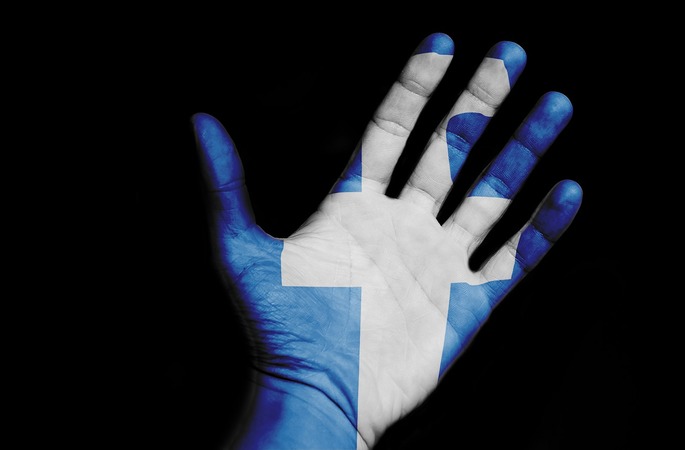I have only been on the Facebook digital platform for about two and a half years. Observing, commenting, joining online groups, subscribing to digital publications, and signing up for various events in the City to which I have recently moved, which are promoted on Facebook. I am entertained by the choice of tools that can be used to enhance a user’s profile and help us present ourselves in ways that we choose. And I am fascinated by the profiles people create for themselves.
People use FB for different reasons: some professional and some social, some to build a following, others to keep in touch with friends in another hemisphere. Instant Messenger means you can share events in your life – literally – in an instant. You can even call Uzbekistan in real time via Messenger and hear your friend speaking more clearly than via a landline. You can share photos, promote the causes you care about, review services and events you have experienced, speak out on world issues, and get acquainted with people from everywhere, free of the constraints we sometimes feel in real life: shyness, doubt, cultural barriers, the awkwardness of the ‘otherness’ of the other.
Facebook is a wonderful instrument of engagement and connectivity. I have seen many people using it with energy and positivity to build their platforms as writers, journalists, activists, entrepreneurs and creative artists.
I appreciate 100% the way people using FB would otherwise be marginalised or less encouraged in an industry or workplace or culture to express themselves and be heard. Women and girls in particular, in all countries where they have access to a computer, can be seen rising in influence and increasing the impact of their presence via the successful building of their work and personal presence on public social digital platforms.
As they do this, they challenge the existing users of the platform. FB is like any other geographical territory, and human beings are inherently territorial. FB discussions are infamous for their volatility, and the ‘instant’ nature of the technology encourages reactivity in its users. I have seen many discussions and comment threads in which articulate and impressive women are attacked, belittled and ridiculed by men – and other women – who seek to diminish and silence them.
People whose opinions others find persuasive are known as ‘influencers’, ‘opinion makers’ and ‘thought leaders’. And they can – and do – leverage this influential capacity, politically and socially.
The essential tribalism of human culture is perfectly conveyed in cross-section in many encounters and conversations conducted on the digital platform.
People assert, agree, contradict, sneer, praise, affirm, and express wonder or derision at the words uttered by others.
People get supported and rewarded (with likes and follows) for successful behaviour, and punished (by no likes or comments) for what is not endorsed by their peers.
This works to powerfully impact our conduct, through our human need for peer approval and popularity. We can find ourselves behaving in ways that build our approval rating – even if what is apparently popular is morally low or has a negative impact on our community, such as racism, sexism, or victimisation of others.
How do you build the digital platform you want to build, and demarcate and defend your professional and personal space in this volatile online world, while minimising the impact of trolls, hecklers and people who do not wish you well? Here are some ideas:
1. Keep your personal and professional accounts separate. Select from the start which aspects of your life you want to share on which platform. LinkedIn content should obviously be far more factual and formal than Instagram. We are advised not to ever share personal or family photographs or location settings publicly, to protect our safety and privacy. Also, people will form opinions of your lifestyle and socio-economic status by the photos you share of where you eat or which hotel you are staying in. Be selective about what you show. Do not attract petty envy unnecessarily.
2. When befriending people, or being asked to connect, initially put everyone you do not know on ‘Restricted’ settings, and observe what they say and how they conduct themselves: the way they deal with others over a period of time. Remove the initial restrictions over time. This is far less stressful than starting with utmost openness and then restricting as the result of disturbing behaviour.
3. Exercise your preferences. If you find that a person uses language you do not like, or makes statements that make you frequently uncomfortable, you can ‘see less of them’, you can unfollow them, you can remain ‘Friends’ but never interact. Of course, over time, this means that no real relationship is occurring, and by default, the connection becomes friendship in name only. People on FB periodically ‘cull’ their friends lists. If there has been no contact for a while, they can delete without warning. This is the same principle that they use for culling clothes they have not worn for too long!
4. Realize that people’s minds in a reactive and verbally aggressive medium are not likely to be changed via argument. Stop arguing! Ad hominem is not wonderful, but almost always upheld. Arguments become very subjective, and very personal, very fast on FB.
5. The block button is a beautiful thing. Do not feel the need to explain to the person that their behaviour is unacceptable or disturbing or annoying. Just block them! You can also ban them specifically by name from any page you have created. If you are an activist, or a person who expresses controversial views, I suggest you look up the profiles of anyone who comments on other people’s threads in ways that alert you that they might have ‘issues’ which might impact you. Pre-emptive blocking of those people clears your digital space.
6. Be aware that many people are opportunistic in the way they – almost on cue – feel the impulse to ‘speak out’ about hot-button issues of the day, doing so to play to their audience and create content on their platform to increase their own perceived relevance. Do not play along unless you want to help them build their brand!
7. If you disagree or want to call someone out for something they have said on their page in front of their friends or on the public platform, do it via Messenger. If anyone does the opposite to you and does not respect your right to express yourself in your or their space, delete their comment.
8. Be alert to the fact that some people tag their friends to join in packs to attack others and create a spectacle on FB. They like to become known as entertaining others with their articulacy in bullying, jeering and mocking. Harassment and abuse thrive on digital platforms, and many people witness it, and say nothing. This may be because they do not want to openly disagree with the author of the post, who may then turn on them, or because they do not want to further the reach of the post by commenting or responding to it. Sometimes people comment on abusive threads without realising the full context or nature of what they are adding their own name to. Be aware that people today using social media can be charged not only with authoring libellous or malicious content, but also for participating to further such content.
9. If any FB conversation you are participating in deteriorates into abuse, threats or harassment, take screenshots of what is said. Do not just share them on your page. If it is seriously vicious, print the comments out and take them to the police. The CID in many countries has a Cyber Crimes Unit which has the power to investigate abusive behaviour, and monitor and shut down the platforms of those who have a pattern of abusing others on FB. With evidence, you can have abusers charged with malicious harassment, and officially warned. Some of these people are likely to have psychological problems, and a compulsion to attack others. A warning of this kind can protect us all, by identifying what is actually unacceptable. Some people might be surprised to see the names which appear under the abusive comments. And this will disrupt the normalisation of this behaviour, and help identify those with a history of abusive conduct online. Share them on your page, if you want to expose the actions of the perpetrators, and show the public platform what abusive language, online harassment and cyber-bullying look and sound like.
10. Do not be shamed or silenced by those who are threatened by articulate women who are speaking out publicly. Some people are offended simply because such women exist! Do not allow your platform to be damaged or disfigured by those who wish to offend you or target you.
Be informed, be expressive, and claim your space!



